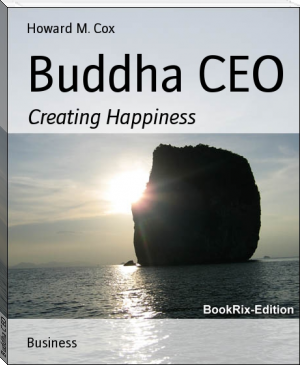Buddha CEO - Howard M. Cox (best book recommendations TXT) 📗

- Author: Howard M. Cox
Book online «Buddha CEO - Howard M. Cox (best book recommendations TXT) 📗». Author Howard M. Cox
Buddha, CEO
(Creating Happiness)
Preface
This is a business book, not a religious book. I do mix spirituality with business as I do not believe that you can live two lives. One that is work filled and on that is sprit filled. The only way to achieve success is through spirit filled work.
Although, this is primarily a business book, I want to make clear that the system is just as applicable to non-profits as it is to the for-profit world of business. In addition, most of the principles are applicable at the personal or family unit as well.
I am a Christian by birth, environment and culture. However, I share a belief with His Holiness the 14th Dalai Lama as follows from his official website http://www.dalailama.com/page.2.htm:
As far as one truth, one religion is concerned; this is relevant on an individual level. However, for the community at large, several truths, several religions are necessary.
Therefore, in my spiritually based business book that follows, I borrow teaching from many world religions.
However, I don’t stop at borrowing from the world’s religious writings. I believe that there is no need to reinvent the wheel during the process of writing this book. I also borrow metaphors and examples from the world of competitive sports and other relevant business authors and role models.
The value in this book is not in the uniqueness of the basic information; it is in the macro way that it has all been weaved together into a comprehensive blueprint to follow in business.
My goal is to provide a unified theory of how to achieve organizational and individual success by pulling together all of the pieces of the puzzle into one hopefully easy to assemble picture.
The last question to answer then is why Buddha CEO, since I will borrow from many other sources than just Buddhism. The answer is that the macro system that I am using as a guide to achieve my goal is the Buddhist 4 Noble Truths. Therefore, I feel the Buddhist’s should get the most credit.
The majority of the Buddhist concepts incorporated in this book come from the following; “The Teaching of Buddha” by Bukkyo Dendo Kyokai, Tokyo (Society for the promotion of Buddhism).
The Society for the promotion of Buddhism is the essential equivalent of the Gideon’s in Christianity. I picked the book up in a hotel room in San Diego in the mid 90’s because I had forgotten to take reading material on our vacation.
I have read it probably around a hundred times and it has provided great comfort and counsel to me in my life. I thank them for this gift and hope that I help their cause by passing along some basic information about Buddhist Philosophy in this book.
Buddha CEO, LLC’s Community Commitment
Since the spirit of this book and the purpose of the Buddha CEO organization are to create happiness, we would be hypocrites if we did not walk our talk. Therefore, we are dedicating 10% of the after-tax profits of Buddha CEO to the Buddha CEO Foundation.
The Foundation will dedicate itself to creating happiness with an emphasis on developing global happiness sustainability. It is a variation of the old adage that it is better to teach and man to fish than give him a fish.
In this same spirit, it is better to motivate and educate the world on happiness creation than to instigate individual unsustainable moments of happiness. This not to minimize the importance of random acts of kindness and generosity with are much appreciated. It is just a recognition that these along are not enough and we need to spread the knowledge and wisdom of happiness creation around the world.
Everything worthwhile starts with a purpose
This purpose of this book is two-fold:
1. To raise the bar of what we should be trying to achieve organizational and individually in our work and personal lives.
2. To provide the action steps and related tools to attain the new goal.
So, what is the bar? Why are we here on earth in general and why do our organizations, profit or non-profit exist; to attain perfect Enlightenment.
What is enlightenment? According to Merriam-Webster Online it is as follows:
Buddhism: a final blessed state marked by the absence of desire or suffering
I believe this is the goal; the absence of desire or suffering. My first objective is to inspire you to share that vision with me.
Why Enlightenment
I don’t think I will get many arguments on the point that our objective ought to be to remove suffering; to remove suffering in our souls, our organizations and the world in general.
But what about desire; why would our goal be to eliminate desire? Isn’t that the basis of our capitalistic, entrepreneurial western culture? Isn’t this the real rub between the west and Buddhism?
First of all, let’s define our terms. So, what is desire? According to Merriam-Webster Online it is as follows:
A conscious impulse toward something that promises enjoyment or satisfaction in its attainment
Buddha believed that desire in its noun form defined above leads to suffering. He believed that the two concepts were inextricable linked together; one follows the other, suffering follows desire.
Buddha taught that we live in a world of causes and conditions. Suffering is a condition that is cased by desire. Therefore to remove suffering you must remove desire.
The question is what desires must be removed. The key to understanding the power of this principle is to differentiate between desires of the heart and desires of the senses.
Buddha had desires. He made four great vows:
1. To save all people
2. To renounce all worldly desires
3. To learn all the teachings
4. To attain perfect Enlightenment
Based on the above, you can see that you can have goals and still eliminate suffering. The desires that need to be eliminated are the worldly desires. Noble purposes or goals will not create suffering, only worldly ones.
The other important point to make is that we do not all have to take a vow of poverty to reach enlightenment. We can enjoy the fruits of a well lived life in whatever form and volume they may come to us without causing suffering.
Suffer comes from two sources:
1. Worldly desires
2. Grasping and clinging to the fruits of the world we attain on the road to noble goals.
So it’s not the fruit, it the grasping and clinging to that fruit that creates the suffering.
Lastly, my case for Enlightenment must include a modern day definition. Buddha lived 2500 years ago. Therefore, there is always a possibility for the meaning to be lost in translation over the years.
The leader of the Tibetan Buddhists is the Dalai Lama. His teachings and writing in today’s language is the best resource we have to understand the meaning of the Buddha’s original writings.
According to His Holiness the 14th Dalai Lama’s official website; http://www.dalailama.com/page.2.htm:
All human beings are the same. We all want happiness and do not want suffering. Even people who do not believe in religion recognize the importance of these human values in making their life happier.
Therefore, in modern day terms, the goal is to create happiness by removing suffering. This is the bottom line process that will ultimately lead to Enlightenment; continual strive to remove suffering and therefore come closer to the goal of happiness.
Happiness for us, our families, our organizations, our customers, our supply chains, our communities and the world at large.
The System
The Buddhist system is based on their Four Noble Truths:
1. Suffering exists
2. There is a cause for this suffering
3. There is a way out
4. Perfect thought, perfect word & perfect deed
The system begins with a recognition that suffering exists in our lives, our organizations, profit, non-profit and governmental, and in our world in general.
To this point, I have never received a credible argument against the Buddhist system. I never met anyone who claims that there is a lack of suffering in this world.
The next step in the system is the key to the entire paradigm. To acknowledge there is a cause for the suffering sets up the possibility that the causes for the suffering could be removed.
You have to choose between the following two viewpoints:
1. Stuff happens
2. Stuff happens for a reason
You must choose one or the other. Either everything that happens is random and we are subject to one uncontrollable event after another; or, everything that happens in this moment was set into motion by actions taken by us or someone else in a previous moment.
If you choose the stuff happens paradigm, you never have to take personal responsibility for what is happening at home or at work. However, you also have to conclude that you are helpless and hopeless to effect any change in your life or work circumstances. This is a paradigm of defeat, plain and simple.
If you believe that “stuff happens for a reason”; then this is a double edged sword as well. You must take some personal responsibility for what is frustrating you in your life and work. On the other hand, you can be filled with optimism and hope that you can change your actions somehow and reduce or remove some or all of these frustrations over time.
Causes and Conditions
Buddha taught that in this world there are three wrong viewpoints. First, some say that all human experience is based on destiny, second, some hold that everything is created by God and controlled by his will, third, some say that everything happens by chance without having any cause or condition.
If the first view were true, both good and evil acts are predetermined, good times and bad predestined, nothing would happen if it was not to be and there is no way you can influence the future through your present moment choices. This flat out makes no sense.
The same point is true of the other two wrong viewpoints. If everything is in orchestrated by God’s hands or completely dependent on chance, what hope has humanity except in submission.
Buddha taught that all three of these viewpoints are wrong and that everything is a succession of present moment events brought about by an accumulation of previous causes and conditions.
I don’t believe that the above is inconsistent with Christianity. Buddha did not take a position on the question of did God create all things. He only contends that God purposely does not control all things. What would be the point of our human existence if he did?
The great purpose of this precious human life is to see how we independently perform in this all too “real life” existence. We can ask for God’s guidance and study his word. However, in the end what we make of this life and this earth is 100% up to us and a product of the accumulation of choices we collectively make as a human race.
The Way Out
Knowing that there are causes for all human suffering and there





Comments (0)